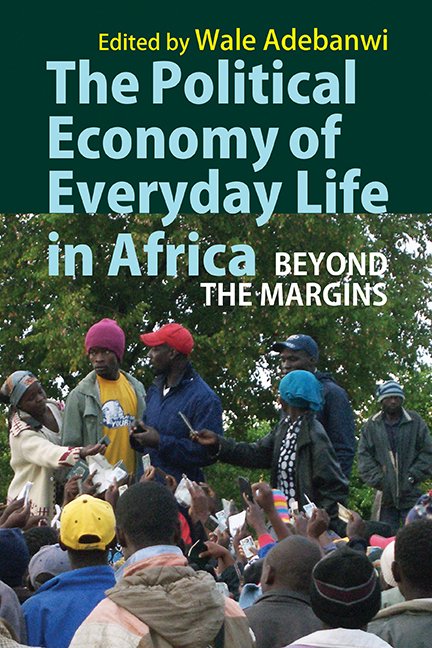Book contents
- Frontmatter
- Dedication
- Contents
- Maps, Illustrations & Tables
- Notes on Contributors
- Foreword
- Acknowledgements
- Approaching the Political Economy of Everyday Life An Introduction
- Part I MONEY MATTERS: CURRENCY & FISCAL LIFE STRUGGLES
- Part II LABOUR, SOCIAL LIVES & PRECARITY
- Part III MARGINALITY, DISAFFECTION & BIO-ECONOMIC DISTRESS
- 7 Precarious Life Violence & Poverty under Boko Haram & MEND
- 8 The Debt Imperium Relations of Owing after Apartheid
- 9 Marginal Men & Urban Social Conflicts Okada Riders in Lagos
- 10 opona, Social Relations & the Political Economy of Colonial Smallpox Control in Ekiti, Nigeria
- Part IV HISTORICITY, TEMPORALITY, AGENCY & DEMOCRATIC LIFE
- Afterword: The Landscapes Beyond the Margins Agency, Optimization & the Power of the Empirical
- Index
7 - Precarious Life Violence & Poverty under Boko Haram & MEND
from Part III - MARGINALITY, DISAFFECTION & BIO-ECONOMIC DISTRESS
Published online by Cambridge University Press: 31 August 2018
- Frontmatter
- Dedication
- Contents
- Maps, Illustrations & Tables
- Notes on Contributors
- Foreword
- Acknowledgements
- Approaching the Political Economy of Everyday Life An Introduction
- Part I MONEY MATTERS: CURRENCY & FISCAL LIFE STRUGGLES
- Part II LABOUR, SOCIAL LIVES & PRECARITY
- Part III MARGINALITY, DISAFFECTION & BIO-ECONOMIC DISTRESS
- 7 Precarious Life Violence & Poverty under Boko Haram & MEND
- 8 The Debt Imperium Relations of Owing after Apartheid
- 9 Marginal Men & Urban Social Conflicts Okada Riders in Lagos
- 10 opona, Social Relations & the Political Economy of Colonial Smallpox Control in Ekiti, Nigeria
- Part IV HISTORICITY, TEMPORALITY, AGENCY & DEMOCRATIC LIFE
- Afterword: The Landscapes Beyond the Margins Agency, Optimization & the Power of the Empirical
- Index
Summary
The relationship between existential precarity, moment to moment, and the long processes of a ‘structure-in-crisis’, is a question for empirical study of exactly how the effects of an improbable structural condition are generated, perpetuated and inserted into ongoing life. The diagnosis of longevity then opens up a wide and long force-field that demands empirical study.
(Jane Guyer 2016a)This chapter engages with three broad themes addressed in Jane Guyer's (2007, 2016a, 2016b) recent work: temporalities and near futures (and especially the temporalities of immediate precarity and deep or structural time), modernity's aporias (the doctrines of the religious and the secular in relation to the contradictions and failures of modern secular national development) and the figure of the pauper or more properly the relations of violence and poverty. Much of Jane's work has of course built upon her hugely influential exploration of the cultural and political economy of Nigeria, a part of the world that has struggled throughout its postcolonial history with the failures of secular development, with the challenges of building a democratic future in a pluri-ethnic federal system, and with stark realities of political violence that surfaced almost immediately after independence with the descent into the Biafran civil war. Nigeria will be my crucible too in this chapter but I want to view the trio of concerns through the lens of the two insurgencies that have arisen since the return to civilian rule in 1999.
Boko Haram and the Movement for the Emancipation of the Niger Delta (MEND) arose in different parts of the country and appear to share few family resemblances. They are of course very different. One is draped in the language of true Islam, the full implementation of shari'a law, a rhetoric of restoration and purity, and a hostility to any sense of multi-religious tolerance linked to Boko Haram's deepening affiliations with global jihadist networks. The other is resolutely secular and modern; it appears to resemble a militant civic nationalism calling for ‘resource control’ and constitutional reform (including of fiscal federalism).
- Type
- Chapter
- Information
- The Political Economy of Everyday Life in AfricaBeyond the Margins, pp. 179 - 215Publisher: Boydell & BrewerPrint publication year: 2017

